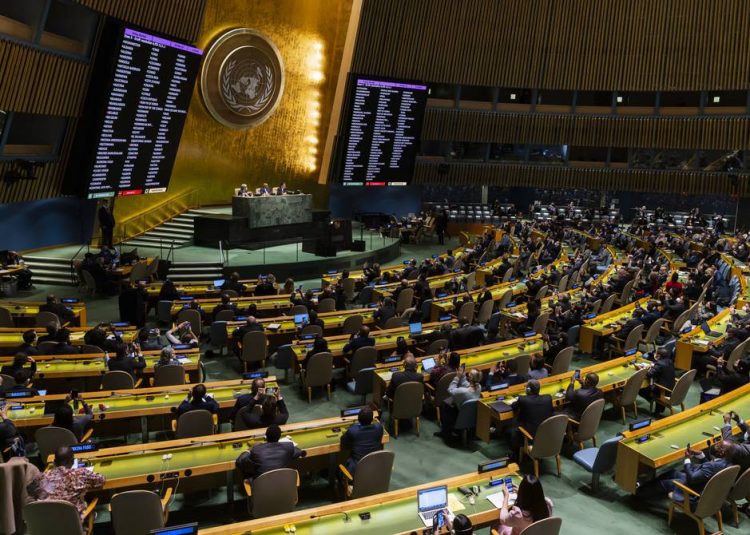Russia’s military offensive in Ukraine placed the Cuban government in a serious dilemma. How to position yourself against an action that violates international law and that, instead of the usual violators, has been committed by one of Cuba’s main economic and political partners?
Two days before the start of the Russian military operation, on February 22, the Cuban Ministry of Foreign Affairs (MINREX) issued a statement advocating a diplomatic solution through dialogue and calling for the preservation of international peace and security. The next day, President Miguel Díaz-Canel received Viacheslav Volodin, president of the Russian State Duma. According to a note published by the MINREX that same day, in addition to expressing “its solidarity with the Russian Federation in the face of the imposition of sanctions and the expansion of NATO towards the borders of that country,” the Cuban president would have advocated “for dialogue and a peaceful solution to the conflict between Russia and Ukraine.” Curiously, this last aspect, so relevant, was not equally reflected in a similar informative note published the following day in the printed edition of Granma newspaper.
Two days after the start of hostilities, on February 26, the Cuban government issued a statement pointing to the expansion of NATO as the factor leading to the current scenario in Ukraine and stated that “Russia has the right to defend itself.” On the other hand, through a fine exercise of verbal juggling, it recognized the “use of force and the non-observance of legal principles and international regulations,” but without explicitly censuring Russia. Likewise, it ratified Cuba’s adherence to international law and its commitment to the Charter of the United Nations, in addition to proclaiming that it “will always defend peace and oppose the use or threat of force against any State.” Finally, among other aspects, it advocated a serious, constructive and realistic diplomatic solution to the crisis.
At the same time, the conflict in Ukraine has provoked a diplomatic frenzy in the United Nations system. On February 25, Russia vetoed a resolution condemning its actions in the Security Council, introduced by Albania and the United States. A similar initiative was approved in the General Assembly on March 2, with broad majority support (141 votes in favor and 5 against), although it should be noted that it was not supported by a bit more than a quarter of the UN member countries, a fairly significant number at the current juncture when the United States and its Western allies are trying to establish the image that the entire world is resolutely opposed to the Russian military intervention.
Cuba was among those that abstained, accompanied by 34 other countries, including some with which it has important bilateral ties or that hold significant weight at the global or regional level, such as Angola, Algeria, China, India, Iran, Kazakhstan, Pakistan, South Africa and Vietnam. Twelve other countries, including Venezuela, did not participate in the vote. Subsequently, on March 4, another resolution of the same tenor was approved in the Human Rights Council with 32 votes in favor, 2 against and 13 abstentions, including that of Cuba among the latter.
Cuba’s abstentions in the General Assembly and in the Human Rights Council could be surprising since its diplomacy usually takes sides on transcendental issues of international politics (although an abstention in an international organization does not necessarily mean not taking sides in a political sense, as I will point out later).
In this regard, in certain media, and on social networks, some people have raised the strange idea that, by not condemning the violations of international law by Russia, the Cuban government would be putting the security of its own country at risk, by thus facilitating the creation of the conditions for an eventual U.S. military invasion. Such an assertion shows a very poor understanding of the realities of international politics and of the United States’ policy towards Cuba, not to say that it is a frankly malicious approach.
Undoubtedly, international law is an important contributing factor, within a broader set of elements, to preclude any type of U.S. military intervention against Cuba. But from there to think that international law is a kind of protective shield that guarantees the physical security of Cuba against the neighboring superpower is far-fetched and would be a sign of great naivety. Cuba’s dissuasive mechanisms against the enormous U.S. military power are based mainly on very varied and multidimensional political and military factors that determine, in a cost-benefit analysis from the U.S. perspective, that a favorable situation for a military intervention against Cuba does not take place.
In other words, the history of U.S. foreign policy, in general, and of its relations with the countries of the Caribbean Basin, in particular, offer ample evidence that the government of that country would not hesitate to crush international law if at some point it came to consider that a military action against Cuba would have benefits clearly greater than its costs.
With regard to the same matter, in a previous comment, I have already argued the inadmissibility of trying to establish a kind of equivalence or capricious comparison between the situations of Ukraine and Cuba, as relatively small countries located in the geographical vicinity of their respective great powers that are much more powerful. On this, I will limit myself to recalling that, unlike the path followed by the current Ukrainian government, the Cuban leadership has given absolutely no sign that it intends to establish a military alliance with Russia aimed against the United States.
Cuba’s abstentionist position in the voting should be understood as the only option that allows achieving a balance between the considerations that have to do with political realism and those that have to do with its traditional adherence to unrestricted respect for international law, in circumstances in which the Cuban government’s margins of maneuver are very small. If only the former had been considered, Cuba should have voted against the resolutions condemning Russia’s actions in Ukraine. On the contrary, an absolute consideration of international law would have led Cuba to vote in favor of the resolutions.
Russia is one of Cuba’s main trading partners and both countries have extensive technical cooperation in the most varied spheres. It is the country that, literally speaking, brought oxygen to the Cuban people during the worst moment of the pandemic, thus avoiding the occurrence of a greater loss of life due to COVID-19, in addition to making important material donations. In the present and very serious international circumstances, voting in favor of the resolutions in the UN would have been interpreted by the Russian government as an unfriendly act and a manifestation of proverbial ingratitude. And that would not seem to be exactly the prescription for maintaining good relations with an important economic and political partner, which is also a great power within the concert of nations, with nuclear weapons and the right to veto in the Security Council.
A country like Cuba, harassed and blocked by the United States for more than 60 years, and which for this and other reasons is suffering from an economic crisis that has lasted more than three decades, cannot afford to fight with a great power who helps her, to favor another adversary who savagely attacks her. To sum up, voting for the resolutions and thus against Russia would have been a monumental display of political cretinism. Instead, in the current situation, a position of abstention in the voting of international organizations is politically favorable to Russia and its government surely understands it that way. On the other hand, a vote against the resolutions would have been indefensible for a country like Cuba, which proclaims its adherence to unrestricted respect for international law.
Some commentators have also criticized Cuba’s stance of leveling its criticism at U.S. and NATO policies and actions, rather than publicly rejecting Russian actions. In this international debate on the adjudication of responsibilities for the current crisis, as is the case with the votes at the UN, the positions of the Cuban government are on the minority side, but that does not mean that they are in bad company. In this regard, I consider it sufficient to note that actors as disparate as John Mearsheimer, possibly the leading international relations theoretician alive, and the Global Times, unofficial spokesman for the Chinese Communist Party, have agreed to assign primary responsibility to the governments of the United States and NATO for their expansionist policy towards Eastern Europe. But this type of more objective and profound analysis will find it very difficult to prevail, at least in the short term, over the superficial and hysterical media avalanche promoted by a Western bloc that seems interested in recreating an anti-Russian pandemonium.
Depending on the final outcome of the ongoing processes, and with the benefit of hindsight, future historians will describe Russia’s military intervention in Ukraine as a brilliant move that would have changed the distribution of international power in its favor, or as a disastrous miscalculation that would have catalyzed the decline of its status within the ranking of the great powers. In the same way, the position assumed by Cuban diplomacy can be judged historically, but any serious, realistic and balanced contemporary political analysis should conclude that abstention was the most sensible decision and that it best serves the Cuban national interest in the present circumstances.











So Cuba puts her self in the same position as someone who stands by and watches while a thug murders his neighbour and his neighbours children. Shameful. I can’t see myself ever vacationing in Cuba again.
Oh take a day off.Cuba at the height of the pandemic,sent it’s medics out across the globe to assist in saving lives.Cuba owes the west nothing.Superb people,superb country.
The same goes for the USA invading Iraq and killing hundreds of thousands of men women and children. Shameful. I can’t see myself vactioning in the US again.
People should consider signing this appeal.
No war on Ukraine
• Russian troops out of Ukraine!
• No to war!
• Refugees welcome here!”
https://nowaronukraine.org/?fbclid=IwAR0otvs5t4nJFLny3GpCW4bWVjLEXHa44YjPbjPvqqhzn30BxtWbbHSQqZ4
Let’s call for what it is as reported in the International Free Press. It’s an “Invasion and War” on the sovereign nation of Ukraine. Slava Ukraine!
We are the world, we are the children
I wanted to thank you for this fantastic read!!
I absolutely loved every bit of it. I’ve
got you book marked to look at new things you post…